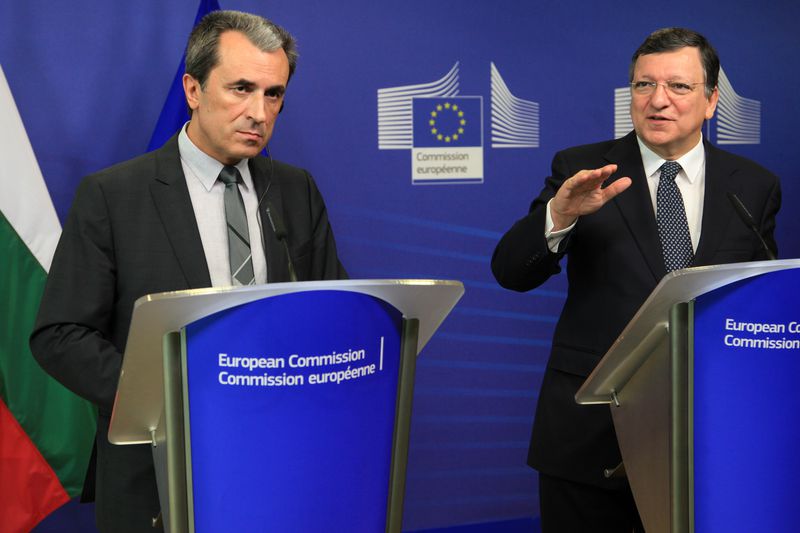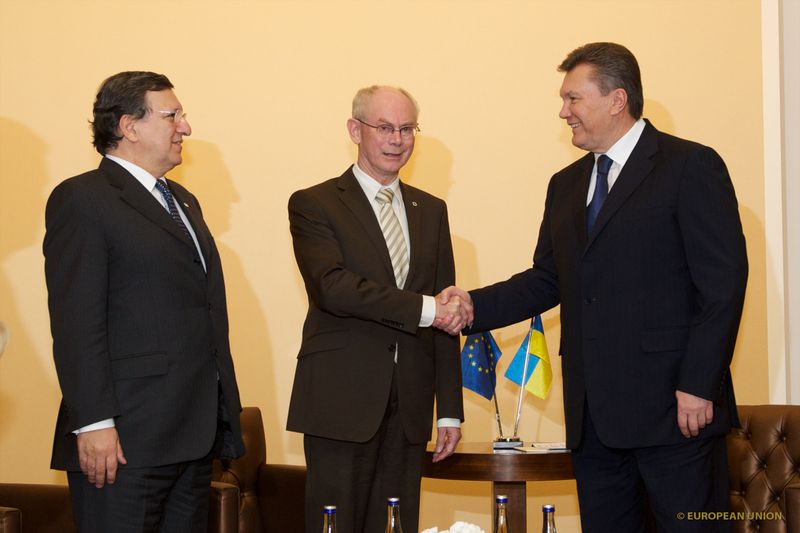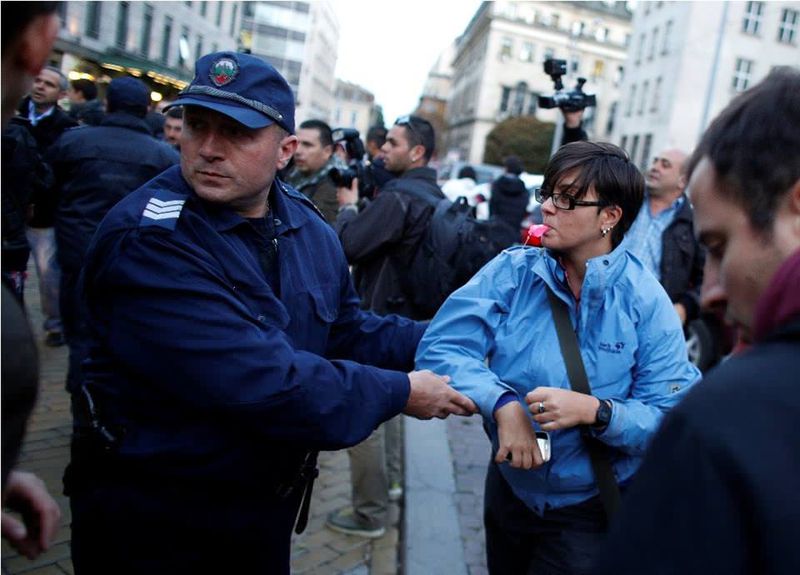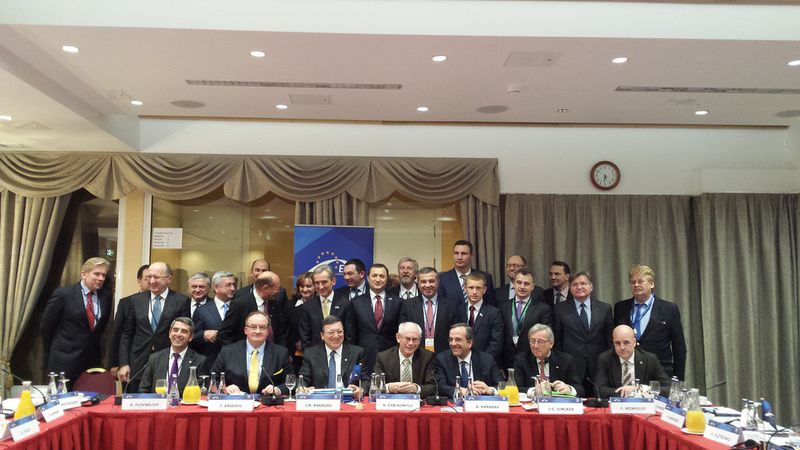The Culture of Resignation
Adelina Marini, July 9, 2013
 In 2010, as part of the Cooperation and Verification Mechanism (CVM), in Romania has been established the National Integrity Agency with the nicely sounding in Romanian name ANI. The agency is the leading anti-corruption section in Romania investigating the incomes of high level officials. Precisely the work of the agency is often subject of attempts for urgent amendments to the legislation, aimed at negating it. It is very important to underscore the name of the agency - for integrity - because in our part of the world and these days in Bulgaria this can be especially painfully seen, integrity is a value that is absent from governance.
In 2010, as part of the Cooperation and Verification Mechanism (CVM), in Romania has been established the National Integrity Agency with the nicely sounding in Romanian name ANI. The agency is the leading anti-corruption section in Romania investigating the incomes of high level officials. Precisely the work of the agency is often subject of attempts for urgent amendments to the legislation, aimed at negating it. It is very important to underscore the name of the agency - for integrity - because in our part of the world and these days in Bulgaria this can be especially painfully seen, integrity is a value that is absent from governance.
On that occasion, the European Commission recalled in its summary report on Romania last July that "It is essential for the credibility of a government that those in charge of ministerial functions enjoy the confidence of the public, for example by stepping down when there is an integrity report from ANI against them". And in its extraordinary report this winter, the Commission wrote: "In November, the National Integrity Agency (ANI) reported against ministers and senior officials, but that has not led to their resignations. It is pointed out that the new government reiterated its goal to tackle corruption, but among the new ministers there are three who are under criminal investigation for corruption". Is not that the thing we expected to hear from Brussels as well? If Bulgaria had a similar agency, then probably the European Commission would have formulated similar messages to Sofia, too.
Bulgaria, however, has a BORKOR. You have probably heard of it, but you hardly connect this name with specific actions. From BORKOR's website [in Bulgarian] we learn that this is "a complex cybernetic model of central planning and development of effectively acting measures and systems of measures against corruption". From 'News' on the website, however, instead of some stressful for the corruption measures, we see the following press releases:
- On June 7th: "Renaldo Mändmets: the European Commission supports BORKOR";
- On March 22: "MEP Maria Gabriel invited the leadership of the Centre for Prevention and Counteraction of Corruption and Organised Crime (CPCCOC) to present the BORKOR project in the European Parliament";
- On March 8: "MEP Iliana Yotova visited CPCCOC".
Around BORKOR many other structures have been established about which the information on the website makes it clear they are a secondary beneficiary of budgetary funds, but hardly will you find any results from their work. I am not ready to put an oath that the existence of a similar to the Romanian agency could guarantee that the Commission would have paid more attention to the disgrace that has been taking place in Bulgaria in the past years, especially given that the Commission believes that it had not made a mistake by postponing the publication of this year's CVM report for the end of the year instead of using the same approach as with Romania and come up with a comprehensive report, saying clearly and unequivocally that resignations should be filed every time there is even the slightest doubt for corruption.
But instead, the Commission, embodied in President Jose Manuel Barroso, said several very important things on June 21st, that make it clear that it has no confidence in the new government and it believes that the monitoring under the Mechanism should continue. This means farewell to Schengen which was successfully bound by several member states with results under the CVM. At a joint press conference with Prime Minister Plamen Oresharski, who was on his first official visit in Brussels after his election, Mr Barroso explained that he is fully aware that the political situation in Bulgaria is tense and reflects the desire of the Bulgarian society to see continuous reforms and the "highest principles of integrity in the political system". Mr Barroso also said that he had expressed very clearly the  Commission's concerns and had advised Mr Oresharski to hold broad consultations on key appointments, especially in the area of the fight against corruption and organised crime.
Commission's concerns and had advised Mr Oresharski to hold broad consultations on key appointments, especially in the area of the fight against corruption and organised crime.
"The candidates should be selected on the basis of merits and should have the highest levels of integrity", Barroso added in his introductory remarks after the end of his meeting with the Bulgarian premier. But he left the news for dessert, saying that it was agreed representatives of the Commission and the Bulgarian government to meet to discuss "broader priorities in the CVM so that progress is achieved before the expected report in the end of the year". The key is in "broader priorities" as this could mean broadening the scope of the Mechanism or a more detailed interpretation of the individual benchmarks. It is not clear whether this will happen no matter if this government remained in power or not, but it is a clear signal that Brussels's patience is depleting. It also means that the Commission will try and "correct" the mistake with letting Bulgaria's reins loose and for sure in the next CVM report we will see the issue of integrity for high level officials, especially related to the fight against corruption and organised crime, broadly developed.
And what can be better than the thousands of protesters since the end of June to have the European Commission and the entire Mechanism on their side, imposed on Bulgaria during the term of Sergey Stanishev, who is currently a leader of the Party of European Socialists and is refusing to resign both as a leader of the Bulgarian Socialist Party and from government. Precisely the lack of a culture of resignation is something that caused the "moral protest", as are also known the demonstrations in Sofia this summer. The world is already pretty globalised, Internet is delivering the news in seconds and in this way we can quickly learn about how in Germany, for instance, officials resign "only because" they were found to be plagiarising and in Sweden "only because" a minister dared to have his mother driven to hospital in the official car.
The Bulgarian political class that has been raging almost uninterrupted through Bulgaria's post-communist history, is not aware of the word "resignation" nor what does it symbolise. Resignation is an acknowledgement of a failure, of a mistake, of an availability of integrity. Resigning means taking responsibility and says "I was wrong and I no longer deserve your confidence". Jose Manuel Barroso said it is very important, while parties are fighting for power, to ensure at least a minimum national consensus on the broader issues. Currently, there is no such consensus in Bulgaria. There is also a lack of the culture of resignation. And that is something that needs to be cultivated. You cannot explain to people who are shouting in front of your windows "resignation" and "mafia" that you have to get another chance; you cannot call a mistake something that speaks of two things: either you are incapable of  checking the past of people you intend to work with, or you are simply fulfilling the initial goal which is to hand over the state to the mafia.
checking the past of people you intend to work with, or you are simply fulfilling the initial goal which is to hand over the state to the mafia.
In both cases, this means incapability or lack of interest to work in the public interest as well as that there is a lack of trust in the goals. That is why, it is not only logical, but it is imperative the government to resign, the party leaders to resign, the compromised people to resign. And as this has not happened in decades, that is why in Bulgaria we have started to call this in a vulgar way [it is hard to translate], thus expressing the entire indignation, rage and helplessness of the thousands who want to finally have a rule of law state, transparency, integrity and resignations, many resignations of all those who have not only not responded to the confidence of people, but ridiculed with it. So, now is the time to impose the culture of resignation.
This article has been published in Bulgarian on June 21st.
 Entrance to the Berlaymont building | © EC - Audiovisual Service
Entrance to the Berlaymont building | © EC - Audiovisual Service | © European Union 2020, EC - Audiovisual Service
| © European Union 2020, EC - Audiovisual Service Commission President Ursula von der Leyen | © European Union 2019 - Source: EP
Commission President Ursula von der Leyen | © European Union 2019 - Source: EP Jose Manuel Barroso, Herman Van Rompuy, Viktor Yanukovych | © Council of the EU
Jose Manuel Barroso, Herman Van Rompuy, Viktor Yanukovych | © Council of the EU Magdalina Guenova | © Magdalina Guenova
Magdalina Guenova | © Magdalina Guenova | © EPP
| © EPP